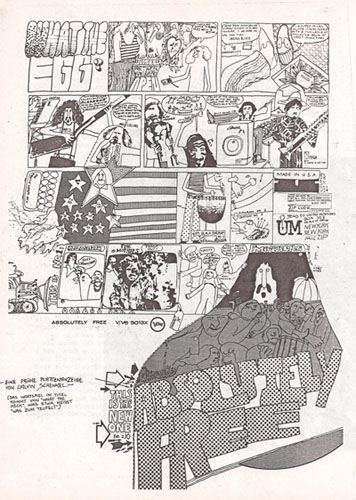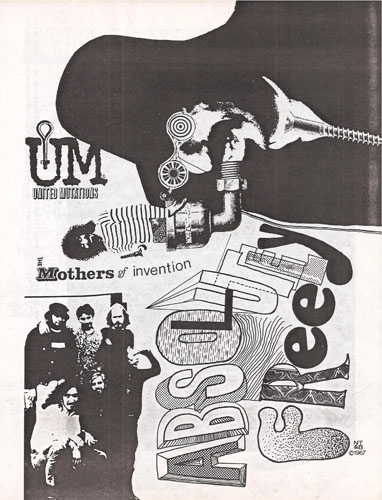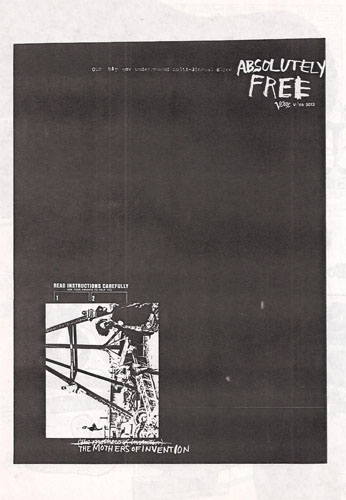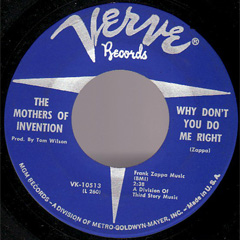The Different Releases
Main Versions
For more details, see Absolutely Free, Vinyl-vs-CDs FAQ, The Zappa Patio and 002 Absolutely Free, The Official Releases, Zappateers.
- 1967 Stereo Mix
- (LP, Verve/MGM, V6-5013, 1967)
- (UK, LP, Verve/MGM, SVLP 9174, 1967)
- (UK, LP, Verve/MGM/Polydor, 2317035, 1972)
- (LP, Barking Pumpkin, BPR 7777-2, 1985)
- 1980s Master
- (CD, Barking Pumpkin/Rykodisc, RCD 10093, 1989)
- (EU, CD, Zappa Records/Today Croydon, CDZAP 12, 1989)
- (CD, Rykodisc, RCD 10502, 1995)
- 2012 Master
- (CD, Zappa Records/Universal, ZR 3835, 2012)
- (LP, Zappa Records/Universal, ZR 3835-1, 2017)
- 1967 Mono Mix
- (LP, Verve/MGM, V-5013, 1967)
- (UK, LP, Verve/MGM, VLP 9174, 1967)
October 6, 2017—50th Anniversary Expanded 2LP
This double 180-gram LP version will include the original record mastered by Bernie Grundman cut directly from the original analog master tapes and a second disc with 20 minutes of rare and unreleased bonus material, including the "Why Don'tcha Do Me Right?"/"Big Leg Emma" single as well as vintage remixes, and radio ads from The Vault on side one and a laser etching of Zappa's visage from the album cover on side two. The package features Zappa's original layout and a reproduction of the rare, highly sought-after "libretto," an 18-page booklet with a foreword by FZ and lyrics to all the compositions, that was offered only by mail order when originally released.
[...]
LP1—Side 1
1. Plastic People
2. The Duke Of Prunes
3. Amnesia Vivace
4. The Duke Regains His Chops
5. Call Any Vegetable
6. Invocation And Ritual Dance Of The Young Pumpkin
7. Soft-Sell Conclusion
LP1—Side 2
1. America Drinks
2. Status Back Baby
3. Uncle Bernie's Farm
4. Son Of Suzy Creamcheese
5. Brown Shoes Don't Make It
6. America Drinks & Goes Home
LP2—Side 1
1. Absolutely Free Radio Ad #1
2. Why Don'tcha Do Me Right
3. Big Leg Emma
4. Absolutely Free Radio Ad #2
5. "Glutton For Punishment . . . "
6. America Drinks—1969 Re-Mix
7. Brown Shoes Don't Make It—1969 Re-Mix
8. America Drinks & Goes Home—1969 Re-Mix
LP2—Side 2 Laser Etching
The Cover Art
Alice Ochs Session
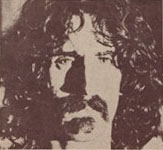
Various Sources
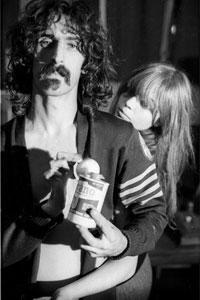
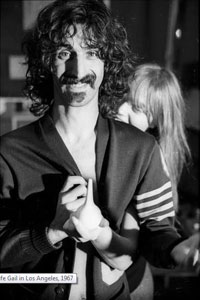
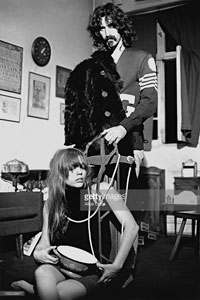
Barry Feinstein—Unicord Session #1
"Merson's 'Invention' Radio Spots Clicking," Billboard, July 29, 1967
NEW YORK—A radio promotion campaign by Merson Musical Products Corporation has met with thumping success, according to company officials.
The effort, in co-operation with stations WOR-FM, New York; WFIL, Philadelphia and WRKO, Boston, featured a one-minute commercial using the music of Verve Records' Mothers of Invention with a message from the group's leader, Frank Zappa. The message invited listeners to write the station for a full-size poster of the combo and information about the Hagstrom guitar line, which is used by the Mothers.
Post cards informed the listener that he could pick up his free poster at his nearest Hagstrom dealer, whose name and address were printed on the card.
To date, there have been some 15,000 responses, and dealers throughout the promotion program area say that many of these have become customers.
Merson vice-president Bernard Mersky said this program is the is the first in a series of Merson consumer-oriented promotion programs. The program was launched a few months ago and will run at least a few more months, Mersky said.
W. H. Manville, "Does This Mother Know Best?," Life Look, 1968
In addition to being a musician, [FZ] is also president of The Nifty Advertising Agency, which Unicord, Inc. employs to reach the vast, new—and golden—youth market.
"Frank is our new corporate image," said Mr. Mersky, beaming at the bearded Mother. "He's our own Betty Furness." Zappa politely got up from the floor to shake my hand, and said, "He means that I sold them an advertising campaign in which my photo appears in every ad." [...] "We had a very small radio campaign, only FM," said Mr. Mersky. "If the kids would send in for our catalogue, we'd send them a poster of Frank and The Mothers. We got fourteen thousand requests." Mr. Mersky sounded awed.
[...] I asked Zappa about his theories on advertising. "Most music companies," he said, "they hype the kids. Our ads are true. There's nothing wrong with advertising, only with liars." He paused. "I hate liars," he suddenly said, with whispered heat.
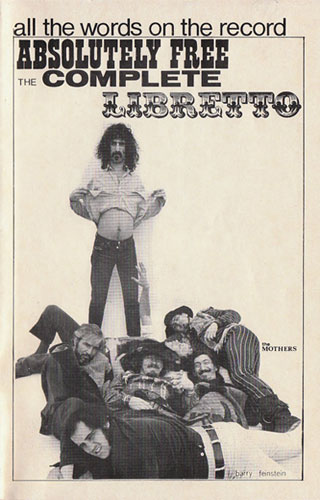
Various sources
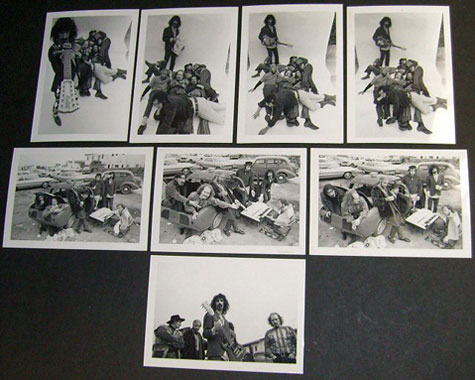
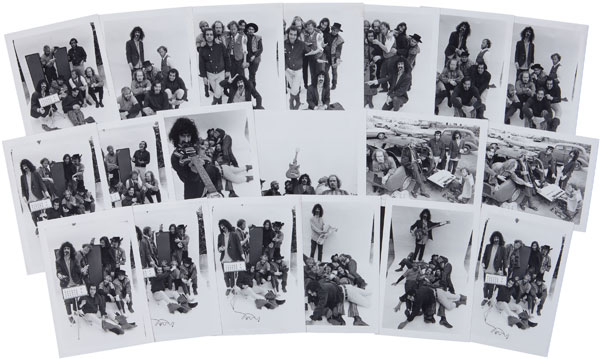
Bizarre Productions Promo
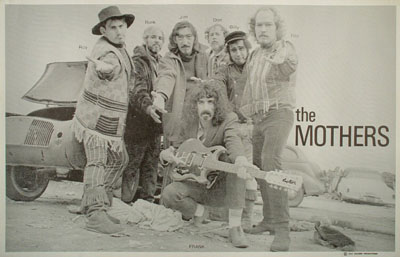
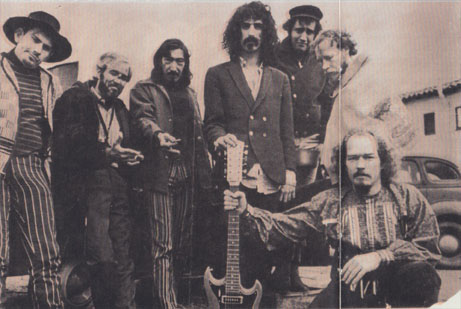
Roy Ralph Estrada, Bunk Gardner, Jim Black, FZ, Billy Mundi, Don Preston, Ray Collins
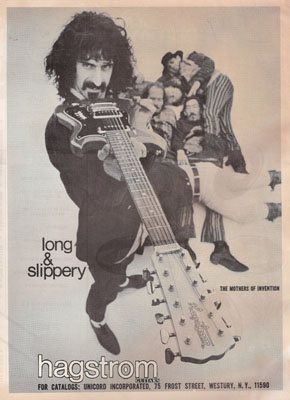
MOI promotional poster, prob. 1967
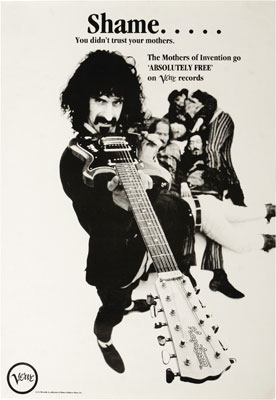
Absolutely Freeeee, Garrick Theatre Program, 1967
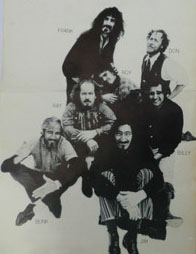
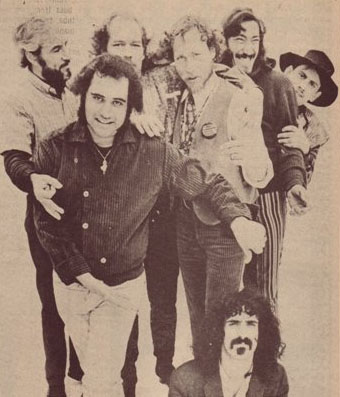
Various sources
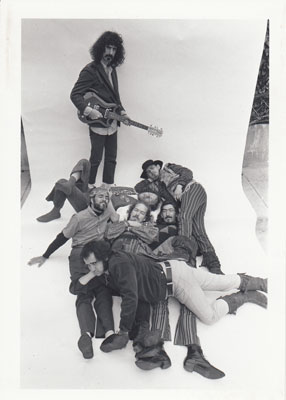
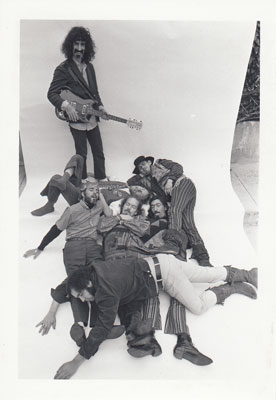
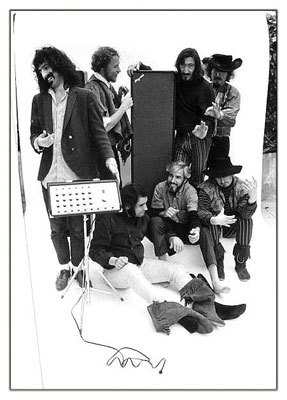
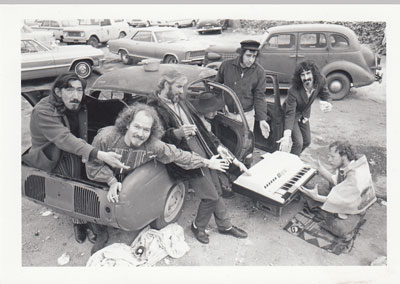
Unicord Session #2
Various sources
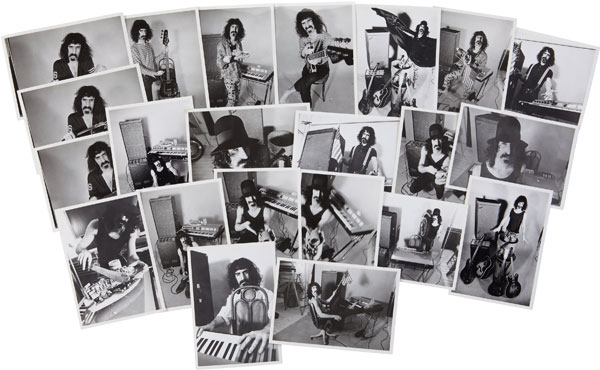
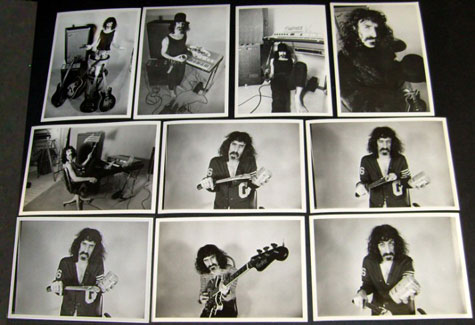
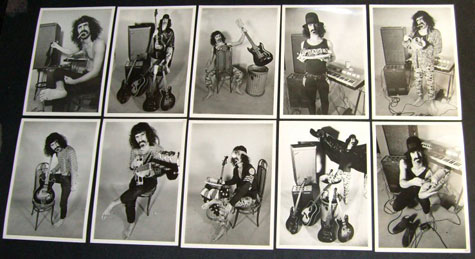
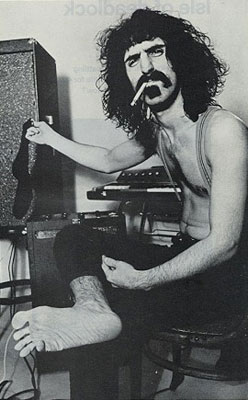
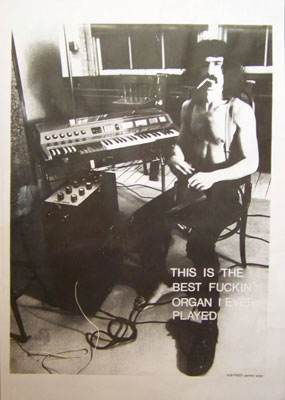
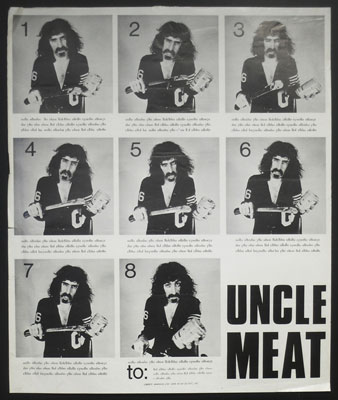
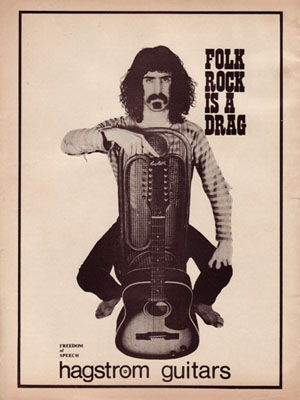
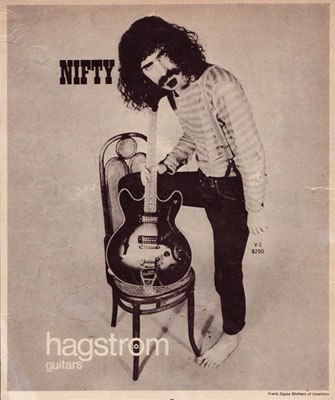
Back Cover Painting
The first place we stayed [in New York], before we could find an apartment, was the Hotel Van Rensselaer on Eleventh Street. We were living in a small room on one of the upper floors. I was working on the album cover illustration for Absolutely Free at a desk by the window. I remember the place being so dirty I couldn't keep the soot off the artwork.
We had a fight with MGM's legal department. On the back of the album cover was a small little notice on a billboard in amongst a whole back cover montage, and it said, in very little letters, "War Means Work For All." And we had a battle with MGM because their legal department felt that there was something wroing in saying that. And they refused to let it out. So in the end it came down to where they agreed to let us use it if we printed it in half tones! So it came out grey instead of black.
The Pachuco Cross
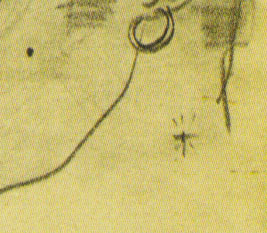
sketch from [FZ's] very own teenage scrapbook
The Recording Sessions
In its initial release, MGM reported to us that the sales of Freak Out! amounted to a paltry thirty thousand units—not exactly a hit. Our royalty was sixty or seventy cents per double LP, which wasn't so bitchen either. On paper, at least, we had a flop. The accounting statements indicated that WE owed MGM money.
When it came time for us to do our second album, Absolutely Free, MGM proclaimed that we couldn't spend more than eleven thousand dollars on it.
[...] The recording schedules were ridiculous, making it impossible to perfect anything on the album.
Director of Engineering: Val Valentin
Recording Engineer: Ami Hadani
[...] WITH SPECIAL APPRECIATION TO AMI [HADANI] & TOM [HIDLEY], THE WORLD'S MOST PATIENT ENGINEERS, AND TO THE SUNSET-HIGHLAND STUDIOS OF T.T.G. Inc.
This album was recorded the week before Thanksgiving, November [24,] 1966 in Los Angeles at the Sunset-Highland Studios of T.T.G. Inc., in a series of 4 sessions (about 25 studio hours). It was edited and re-mixed in New York City at the MGM Studios in 5 sessions (about 35 studio hours) the following week.
11/15/66 (6-9PM & 9:30PM-12:30AM) T.T.G. Studios—Status Back Baby; Plastic People; Son Of Suzy Creamcheese; Garbage Eaters
11/16/66 (6-9PM & 9:30PM-12:30AM) T.T.G. Studios—Remember; No Regret; Call Any Vegetable; Send Santa Claus Back To The Rescue Mission
11/17/66 (1-4AM & 4:30-7:30AM) T.T.G. Studios—If You Like Chickens
11/18/66 (7-11:30PM) T.T.G. Studios—Brown Shoes Don't Make It
"Absolutely Free" was done on 8 track, the first 8 track machine that came out. Half inch tape. "Freak Out!" was done on 4 track, 'cause that's all there was. That was state of the arts recording. TTG Studios. We did "Absolutely Free" at TTG Studios as well, but they had gone to 8 track by that . . .
I remember that we recorded Absolutely Free at TTG Studios on a four-track, I'm pretty sure that's what it was. I certainly remember that it took an unbelievable amount of takes—every eight bars we would do about 28 takes, because there would always be something wrong. Sure, the whole band was playing live and since about half the band couldn't read music and we were playing from memory, there would be a lot of mistakes made. We would just keep going over and over stuff. Since you only have four tracks, you have to kind of play it live.
The first two albums were done four track.
We were back in TTG working on a new 8-track machine because they had the first one in Hollywood. [...]
Although Tom Wilson was listed as producer on everything that we put out on Verve, he wasn't there most of the time. I think he and Frank had made some sort of deal so Frank could be left in charge of production and Tom would be off doing his own thing.
Absolutely Free featured Jim Fielder on guitar, while Bunk Gardner's friend, John Balkin, played acoustic bass on a few songs. [...] Don Ellis played trumpet on "Brown Shoes Don't Make It," one of two songs, the other being "Call Any Vegetable," which were written in Hawaii just before Freak Out! came out.
"After Freak Out was released," he explains, "it sold terribly. In the first year, it didn't do shit. It cost so much money—$20,000—an unheard-of amount of money for that day and age. An album in those days cost $8,000 and this was a double album!" Naturally, MGM went after Wilson, who Zappa admits really did produce Freak Out and "pretty much was producer on Absolutely Free. So when it came time to record Absolutely Free in 1966, MGM got tight with bucks, giving Wilson and the Mothers $11,000 and, according to Zappa, "one day with 15 minutes per tune to do all the vocals on that album. That's right. It's called 'sing or get off the pot.'"
Freak Out cost $20,000—which was preposterous in that day and age. People were shocked. The average rock 'n' roll album then cost $8,000, mainly because it was a collection of all your hit singles with a couple of Chuck Berry tunes thrown in on the side. When Freak Out was released it didn't sell. The first year it didn't do shit, so the company was very upset and when it came time to do the second album they spent a grand total of $11,000. We had one day with 15 minutes per song to do the vocals.
1. Plastic People
The insincere assholes who run almost everybody's country are plastic people. References to Sunset Boulevard, Pandora's Box, CIA, and Laurel Canyon, all relate to the first youth riots in Los Angeles last year.
(And there's this guy from the CIA and he's creeping around Laurel Canyon . . . )
(I hear the sound of marching feet . . . down Sunset Blvd. to Crescent Heights, and there, at Pandora's Box, we are confronted with . . . a vast quantity of PLASTIC PEOPLE.)
Dominic Priore, Riot On Sunset Strip, 2007, p. 25
There was a misbegotten property sale and a plan to build a 14-mile Laurel Canyon Freeway (Route 170) through the area. The plan never saw the light of the day, but still prompted LA County Supervisor Ernest E. Debs to take draconian measures against the Strip's nightlife. [...]
With a convenient 10pm curfew to enforce, police brutality instigated youth picketing, which in turn led to mass arrests and a major riot on Saturday, November 12th 1966. [...] In the months that followed, clubs such as the Trip and Pandora's Box were torn down, and the teen nightlife boom quickly faded.
Me see a neon
Moon above
I searched for years
I found no love
Me see Jamaica moon above
It won't be long, me see my love
2. The Duke Of Prunes
Frank had this very beautiful tune called "And Very True," and when we went in to record it, being a little crazy at the time, after all these years still, I just ad-libbed on the spot. The original lyrics I think were "Moonbeam through the night," something very loving, although Frank doesn't like love songs, and I said, "Moonbeam through the prune, in June, I can see your tits." And, so anyway I just made it up on the spot. So later, after we recorded it—you can hear Frank cracking up on the record—it's a lot of fun; it was fun—in fact, that's my favorite Mothers album, the ABSOLUTELY FREE album—so later, after we recorded it, I told Frank, "Well, you know, I just made up those lyrics, as we went along, so if not money," although I didn't say "Don't pay me" "so if not money I should at least get album credit for it." So he says,"Well, just tell me what you want to put on the album." And so a couple days later, I said, "Well, just put 'Prune: Ray Collins.'" And he put the "Side 3" part. That was out of his own mind.
"The Duke Of Prunes" is a surrealistic love song. Euphemistic sexual imagery popular in country blues tunes, with which many of you might already be familiar, is transmuted in this particular piece from the basic "[fuck] me, suck me, till my eyes roll back baby" to "prune me, cheese me, go-kart . . . " or something like that. This song is very strange.
And in that magic go-kart
I bite your neck
A go-kart is a small, body-less automobile, usually driven by teen-agers on privately-owned racetracks.
5. Call Any Vegetable
"Call Any Vegetable" was written two weeks after we finished Freak Out!, when we were in Hawaii, and it took a year to learn how to play it.
The subject matter of that song deals with the concept of apathy between a member of the audience and any form of inert material.
Jon Naurin, alt.fan.frank-zappa, January 25, 2001
The melody which starts at 1:20 into Call Any Vegetable is identical to the piano intro to Don & Dewey's "Little Sally Walker". Could be a coincidence, of course, but it sounds more than coincidental to me.
How important is sound? I participated in a conversation recently with Herbie Cohen (our manager) about rumors of a government research project. The project, it seems, has been going on for several years. What does sound do to plants? According to Herbie, a field of corn increased its yield—the individual ears even got bigger—because the research team set up loudspeakers in the field and pumped in some music. According to Herbie, the next step is to find out what kind of music the vegetables like the best.
The best clue to this song might lie in the fact that people who are inactive in a society . . . people who do not live up to their responsibilities are vegetables. I feel that these people, even if they are inactive, apathetic or unconcerend at this point, can be motivated toward a more useful sort of existence. I believe that if you call any vegtable that it will respond to you.
The Mothers' "Call Any Vegetable" vs. The Beach Boys' "Vegetables"
Van Dyke [Parks] and I were partial to salads. Strange as it may seem, salads were relatively unknown to Brian [Wilson]. He spent a lot of time with us in our apartment, and then of course we lived with them for a time. I made salads . . . Brian took to vegetables.
Van Dyke had worked briefly with Frank Zappa—one freak out was enough for us—and Frank was also writing a song about vegetables. We took Brian to meet Frank. That was a fun moment.
8. Big Leg Emma
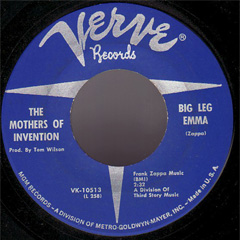
MOTHERS OF INVENTION: "Big Leg Emma" (Verve).
What a voice! I really can't make this out at all. Is it a joke or something? If it is a joke then it's quite good. Who is it? The Mothers Of Invention? Never. I've heard them do some good things and this must be a joke. Actually I think it could well be a hit.
By the way, did you know that "Big Leg Emma" was released as a single? I can't understand why that didn't get on the radio. That's just as, that's just as imbecilic as "Yummy Yummy Yummy." Well, I think the size of the woman's leg had something to do with it. A large stomach— that's one thing. Big legs— I don't know . . .
03/06/67 (11AM-2PM, 3-6PM & 7-10PM) T.T.G. Studios—Fillmore; Dilemma (aka Big Leg Emma); Electric Banana; Why Don't You Do Me Right
Charles Ulrich, February 19, 2010
Joe Travers says that Fillmore is the recording that was the basis of the WOIIFTM version of Who Needs The Peace Corps? (as in "Danced at the..."), while Electric Banana is one of the themes of Absolutely Free (but not the same version heard on WOIIFTM).
Lyrics to "Big Leg Emma's," recorded by Jack Dupree on the King label, ca. 1956. (Songwriter: Lucille Dupree) [...]
I went down to Big Leg Emma's house to get myself a drink of gin
'fore I got in the house good, the law walked in
[...]
10. America Drinks
On this side of the album there are two versions of this set of lyrics. This version which opens side two is in effect an abstraction (in advance of) the set of lyrics which close side two. The opening lines of "One, two, buckle my shoe" and "doopie, doopie' are derived from a tune called "My Little Red Book."
"One and two and buckle my shoe" was used as a count-off by Marc Bolan on "Lean Woman Blues", on the Electric Warrior album, with Flo & Eddie on it.
Andre Mount, February 11, 2009
I noticed on the entry for "America Drinks" (Absolutely Free) that there are some unidentified quotations. I'm pretty sure one of them is the first theme from the overture to Rimsky-Korsakov's Tsar's Bride. It starts right around 1:22 (right after the Fucík quotation) and it's played by (I think) an electric piano.
John Balkin plays electric bass.
I tried to find
How my heart
Could be so blind,
(wanna buy some pencils?)
Dear
Perhaps its the singer's blind heart that's selling the proverbial pencils? There is a common American stereotype, that probably hasn't actually happened since the depression, of a blind person selling pencils out of a tin cup on the street. This image has been perpetuated in movies and cartoons and probably has very little basis in fact. But I'm wondering if the lyric about his heart being so blind inspired the pencil question... I dunno.
11. Status Back Baby
"Status Back Baby" is a song about young acne America and their daily trials and tribulations. It is unfortunate that many young Americans really do worry about losing status at their high school. De Molay is a religious youth organisation in the United States. A Pom Pom Girl is a young lady who cuts strips of crepe paper all week long after school to make an object known as a pom pom, which is a puffy ball composed of strips of crepe paper. After she has manufactured her own pom pom, she will go to the football game and jump high in the air with her pom pom in her hand shouting, as she does so, these immortal words: "We've got a team that's on the beam, that's relly hep to the jive. Come on tigers, let's skin 'em alive." Or, "Push 'em back, push 'em back. We like it, sissboombah." Then they drink beer and get pregnant in the back of somebody's car.
"I'm Losing Status at the High School" jumps into the opening figure of Petrushka.
James Borders, "Form And The Concept Album: Aspects Of Modernism In Frank Zappa's Early Releases," Perspectives Of New Music 39:1, Winter, 2001
A look into the background of a song on the album, "Status Back Baby," suggests how fervently Zappa sought to introduce listeners not just to his brand of satire, but to twentieth-century concert music. Besides borrowing from the first tableau of Stravinsky's Petrushka (compare rehearsal numbers 2 through 5 with "Status Back Baby," 1:27-2:07), it features a paraphrase of the opening measures of Claude Debussy's "La fille au cheveux de lin" (Préludes, book 1) in the triplet countermelody played on the soprano saxophone (albeit transposed from G[flat] to G Major).
They played some records by The Coasters
The Coasters are an American rhythm and blues/rock and roll vocal group who had a string of hits in the late 1950s. Beginning with "Searchin'" and "Young Blood" in 1956, their most memorable songs were written by the songwriting and producing team of [Jerry] Leiber and [Mike] Stoller. [...] The Coasters were formed on October 12, 1955, when two of The Robins, a Los Angeles—based rhythm-and-blues group, joined Atlantic Records. They were dubbed The Coasters because they went from the west coast to the east. The Robins included Carl Gardner and Bobby Nunn. The original Coasters were Gardner, Nunn, Billy Guy, Leon Hughes (who was replaced by Young Jessie on a couple of their early Los Angeles recordings), and the guitarist Adolph Jacobs. Jacobs left the group in 1959.
My school spirit is at an all-time low
I'm friendly and I'm charming, I belong to DeMolay
DeMolay International is an international fraternal organization for young men ages 12 to 21. It was founded in Kansas City, Missouri, in 1919 and named for Jacques de Molay, the last Grand Master of the Knights Templar. [...] Although young women are not permitted to join DeMolay, chapters are permitted to elect chapter "sweethearts" and "princesses."
13. Son Of Suzy Creamcheese
"Son of Suzy Creamcheese" took a year to learn how to play. Can you tell why? The time, the time—it's fantastic. It's four bars of 4/4, one bar 8/8, one bar of 9/8—OK? And then it goes 8/8, 9/8, 8/8, 9/8, 8/8, 9/8, then it goes 8/8, 4/8, 5/8, 6/8, and back into 4/4 again. To get it together now, we just toss it off and it becomes a flop.
"Son Of Suzy Creamcheese" is a stirring saga of a young groupie. Her actions are all motivated by a desire to be "in" at all times. Hence the drug abuse (blowing her mind on too much Kool-aid: acid . . . Stealing her boyfriends's stash: a hidden supply of drugs . . . and leaving Los Angeles for a protest march in Berkeley).
Am I the only one who thinks that the opening line of "Son Of Suzy Creamcheese" sounds like a paraphrase of "Louie Louie" too? "Suzy Creamcheese" (sung to the same melody as "Louie Louie"), "Oh, mama" ("Oh, baby" in LL), "now what's got into you?" (melody somewhat remniscent of "you gotta go").
Suzy Creamcheese
Oh mama, now . . .
What's got into ya?
Blew your mind on too much Kool-Aid
In a hey days of LSD introduction to soon-to-become-flower-power-generation Ken Kesey and his Merry Pranksters practisised a mass "poisionig" of innoncent members of The Grateful Dead audience by adding free acid to soft drinks passed around.
The ritual decribed in colourful details in Tom Wolf book Electric Kool Acid Test.
Heard The Heat knows where you are
"The Heat" or "Heat" is a fairly common synonym for police.
Cruised the Strip & went to Canter's
Vito says she split for Berkeley
14. Brown Shoes Don't Make It
"Brown Shoes Don't Make It" is a song about the people who run the government, the people who make the laws that keep you from living the kind of life you know you should lead. These unfortunate people manufacture inequitable laws and ordinances, perhaps unaware of the fact that the restrictions they place on the young people in a society are a result of their own hidden sexual frustrations. Dirty old men have no business running your country.
Captain Beefheart, Oui Magazine, July 1973
Years ago, I was taped by Frank Zappa, and a lot of ideas on a lot of his records started out with me. Like Susie Cream Cheese, What's Got into You?, and Brown Shoes Don't Make It.
Liner notes
The MOTHERS OF INVENTION play all their own musical backgrounds. The only exception on this disc is BROWN SHOES DON'T MAKE IT where they have added 2 violins, 1 viola, 1 'cello, 1 trumpet and 1 contra-bass clarinet.
Biffy the Elephant Shrew, alt.fan.frank-zappa, October 31, 1999
According to Zappalog, the trumpet is Don Ellis, the clarinet is John Rotella, and two of the string players are Jim Getzoff and Kurt Reher. Dunno how reliable this information is. I mean, Don Ellis???
Charles Ulrich, alt.fan.frank-zappa, October 31, 1999
I can't speak to the reliability question, but I can add that Reher plays cello and Getzoff plays violin. They and Rotella play on other FZ albums:
Rotella—Freak Out!, Lumpy Gravy, Grand Wazoo
Getzoff—Lumpy Gravy
Reher—Freak Out!
11/18/66 (7-11:30PM) T.T.G. Studios, Hollywood, CA—Brown Shoes Don't Make It
MUSICIANS: FZ, Benjamin Barrett (OM), Raymond Collins (mallets), Donald Preston
(piano), Roy Estrada (bass), John Gardner (sax), James Fielder (piano), Tony
Schnasse (aka Billy Mundi; drums), Jimmy Black (drums), James Getzoff (violin), Marshall Sosson
(violin), Alvin Dinkin (viola), Armond Kaproff (cello), Donald Ellis (trumpet), Johnny Rotella (sax), Bob Hartley (copyist), Bill Hughes (copyist)
Charles Ulrich, August 16, 2002
This contradicts the previously-held belief that Kurt Reher played cello on "Brown Shoes Don't Make It", but confirms Getzoff, Ellis, and Rotella.
Don Ellis was brought in to play trumpet on "Brown Shoes Don't Make It." He was the first trumpet player I saw who had a pick-up on his horn and he played it through a Fender amplifier.
FZ, Keyboard Magazine, February 1987
In the song "Brown Shoes Don't Make It" most people hear only the words. They don't realize that there is, in the middle of that song, a completely academic and rigorous 12-tone string quartet going on in the background.
TV dinner by the pool
Only thirteen and she knows how to nasty . . .
An Antelope Valley High School student quoted by Tom Troccoli, alt.fan.frank-zappa, February 24, 1998
It was rumored that the song "She's only 13 and she knows how to nasty" was written about a girl a year younger than me called Patty Keenen who was a dead ringer for Bridget Bardot and looked old enough to buy beer for the boys [...]. And the song "Brown shoes dont make it" was the was it was in our school . . brown shoes just weren't cool.
She's a dirty young mind
Corrupted, corroded
Well she's thirteen today
And I hear she gets loaded
One of the most exciting things that ever happened in the world of 'white-person music' was when the Beach Boys used the progression V-II on "Little Deuce Coupe." An important step forward by going backward.
I used to listen to Frank Zappa, but I—You know, it's been so long that I can't remember what kind of music he made but, it was pretty modern, you know, kind of, crazy modern kind of music.
What would you do, daddy?
Photos taken during the recording of Brown Shoes Don't Make It, T.T.G. Studios, Hollywood, November 1966. The girl who said "What would you do, Daddy?" is Herb's daughter Lisa.

SUZY CREAMCHEESE: WHAT WOULD YOU DO DADDY?
I'd like to make her do a nasty
On the White House lawn
We had problems at Verve because it was a subsidiary of MGM and some lawyer or top exec at MGM in New York was a personal friend of Lyndon Johnson. When we did "Brown Shoes" with the line, "I want to make her do a nasty on the White House lawn," he went ape shit. They were afraid, given the climate of the times—the whole war syndrome—that whatever leverage a company of that size might have with certain friends in Washington might be compromised by having artists on their record label that those friends wouldn't agree with.
15. America Drinks & Goes Home
AMERICA DRINKS & GOES HOME was written in 1964 . . .
"America Drinks & Goes Home" is an unsubtle parody of adult conduct in neighbourhood cocktail lounges in America. The humour is aimed at (1) the type of music your parents like to listen to, (2) the manner in which they like to have it performed (the insincerity of the night-club crooner in his closing address to the alcoholics at the bar), (3) the manner in which the audience persists in talking above the level of the music while it is being performed (which belies their disrespect as an art and for anyone involved in the performance of music).
The one thing that I think is really good about our music is that the
settings for the lyrics are so carefully designed. Supposing you had to listen
to America Drinks and Goes Home for a million times—it would drive
you crazy, for one thing. But eventually, if you're the average stupid layman
who hates music anyway, you might realize how perfect that setting is. Those
words, man. Those things are so carefully constructed that it breaks my heart
when people don't dig into them and see all the levels that I put into them. [...]
Because it was written based on the same subconscious formula that
all those pukers use. You know, II-V-I chord progressions, modulating all the
way around. They modulate normally in a regular song in a circle of fifths.
But this changes key and modulates and it gets weird. There is something happening
in all those changes. And the melody, if you just were to play the melody as
a straight thing, it's an interesting tune. But those stupid, stupid words,
and in that setting with the cash registers and all that—we spent hours putting
that together. Herbie [Cohen] was playing the
cash register. We rehearsed the crowd noises. The talk track itself, which is
underplayed in there, is funny, because they're saying things like, "I
got a new Mustang" [Laughter], and like the girls are saying, "Sally,
will you go with me to the bathroom?" [...]
But that's not all that's happening—technology is not up to reproducing
that one song. I'll tell you what's in it. You've got the song itself. And the
tune, which is a parody of all the changes. You've got the lyrics, which is
a parody of all the lyrics. You've got the vocal performance of the lyrics,
which is a parody of that. You've got the improvised dialogue, which is a parody
of everybody's closing bullshit. [...]
You've got the sound of the setting, of the glasses and the cash register,
which is right in there. You've got the crowd mumble, which was carefully programmed,
like choreographed. Then on top of that, which you can't even hear, there's
a fight going on. We had the crowds separated in two rooms. In the main studio
we had ten people sitting around the microphone, doing these lines on cue, with
the cash register over here and the glass on one microphone. Then in a vocal
booth off to the side we had Ray and Jim [Black] and Roy [Estrada] going through
this number. We had Bunk [Gardner] trying to pick up two girls. You know, "What's
a girl like you doing in a place like this?" All that stuff. And then Jim's
an Okie wanting to beat up a Mexican, who is Ray. They started out as good buddies
and they're drinking beer together, and find out . . . the Indian accuses the
Mexican of going out with his wife and they punch it out. And meanwhile, the
chicks tell this other guy to fuck off because he's coming on too strong, you
know, "What kind of girls do you think we are?" And it's all happening
in there, but you can't listen to it all. You've got to have it on ten tracks
so you can walk around the room and see where it's all coming from.
They would never know as a matter of fact because a lot of the satire that I indulge in is so arcane, so abstruse and bizarre that they just can't dig what level it's on because in satirizing something else, many of the best levels of it go completely un-noticed for instance the most obvious example of it is a tune "America Drinks And Goes Home" on the Absolutely Free album. Many people have not come to realize that the chord progression itself for that song is one of your all time satires on chord progressions—on chord progressions—on chord progressions, that have been used until they are coming out your ass hole, in those old Pop tunes. The melody itself is constructed to fall against that chord progression in such a way that creates a—apparently the bitter-sweet nostalgia of that era, couple with the lyrics which are a parody on not just the lyrics of that era but the attitudes of the people who might have raised their children talking about the good old days. In other words they have got their kids in college now with the class ring and all that shit. I put as much secret stuff into the music as i can so that it becomes interesting for me when I go to listen to it myself later. You work on an album and your hear that stuff over and over again for a month or two months and I really get to hate it so that when I finish an album I can't event stand to listen to it for awhile after it is done. Then when I do, there had better be something there that I can fool around with to keep me—
Terry Gilliam
Terry Gilliam, quoted by Robert Ross, Monty Python Encyclopedia, London, 1997, p. 2
I actually knew Frank [Zappa] before I came to England. Me and my then girlfriend appear on one of the early Mothers of Invention albums. It's some sort of crowd effect and we were dragged into the studio to make noises like drunks in a bar.
Jordi Costa & Sergi Sánchez, Terry Gilliam, el soñador rebelde, 1998, p. 320
According to the 1995 edition of Record Collector, the voice of Terry Gilliam—and of his girlfriend at the time—can be heard amidst the noise of the patrons of a bar that appears in the background of the song "America Drinks (and Goes Home)", included in the album Absolutely Free, by Frank Zappa & The Mothers.
Terry Gilliam, Gilliamesque, 2015, p. 103
For some reason Glenys [Roberts] and I turned up at the studio round the corner from Sunset Boulevard just as Frank and his Mothers needed some extra voices for a party sequence, so we ended up being on Freak Out! and Absolutely Free.
While defacing a couple of books and a poster to me, [Terry Gilliam] confirmed that he'd been a part of the crowd noises on 'America Drinks and Goes Home'—('I used to live just up the road from Frank')—and expressed sadness at the premature death of 'one of the greats'.
"Bill Bailey"? Oh . . . we'll get to that tomorrow night. Yeah.
"Caravan" (with a drum sola)? Right. Yeah . . . we'll do that.


























